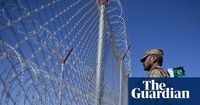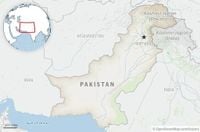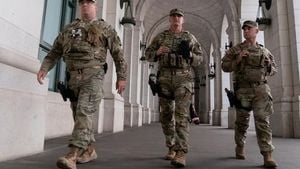Fierce fighting erupted along Pakistan’s volatile Afghan border this past week, as Pakistani security forces mounted a series of high-stakes raids on Pakistani Taliban hideouts. The military operations, which unfolded on September 11 and 12, 2025, resulted in a deadly toll: 19 soldiers and 45 militants were killed, according to statements from the Pakistani military reported by AP and state-run media.
The operations—described by officials as intelligence-based and meticulously planned—targeted three suspected strongholds of the Pakistani Taliban, also known as Tehrik-e-Taliban Pakistan (TTP). The first raid, in Bajaur district of northwestern Khyber Pakhtunkhwa province, left 22 militants dead. In a separate push in South Waziristan, 13 more militants were killed, though the cost was high: 12 Pakistani soldiers lost their lives, with the military lauding their sacrifice, saying they had "fought gallantly, paid the ultimate sacrifice and embraced martyrdom." A third operation in Lower Dir district on September 11 led to a fierce gunbattle, resulting in the deaths of seven more soldiers and 10 militants.
These clashes underscore the daunting challenge facing Pakistan as it seeks to contain a resurgent TTP. The group, which claims to be the world’s largest jihadist front, has a long track record of violence. As The Guardian notes, the TTP has been responsible for some of the country’s most notorious attacks, including the attempted assassination of peace activist Malala Yousafzai, the murder of former Prime Minister Benazir Bhutto, and even the attempted bombing of New York’s Times Square.
In the aftermath of the latest bloodshed, Pakistani military officials issued a stern warning to the Taliban government in Kabul. The militants, they said, were using Afghan soil to launch attacks against Pakistan. The military called on the Taliban authorities to "uphold its responsibilities and deny use of its soil for terrorist activities against Pakistan." This refrain has become increasingly common since the Taliban’s takeover of Afghanistan in 2021, which, according to AP and The Guardian, has emboldened the TTP and provided them with a sanctuary across the border.
Pakistan’s military described the killed militants as "Khwarij," a term with deep historical roots that the government now uses to refer to the TTP. In a controversial move, officials also alleged that the militants were backed by India, though, as AP and The Guardian both report, no evidence was offered to substantiate this claim. Pakistan has long accused India of supporting the TTP and separatists in Balochistan—a charge New Delhi has consistently denied. There was no immediate comment from either the Taliban in Kabul or the Indian government following these fresh allegations.
The deadly raids mark one of the most lethal confrontations in recent months in Khyber Pakhtunkhwa, a region where the TTP once held sway over significant territory. Just last month, Pakistani forces launched a targeted operation in Bajaur, displacing tens of thousands of residents in an effort to root out militants from their former strongholds, as reported by The Guardian.
National leaders responded to the latest violence with a mixture of grief and resolve. President Asif Ali Zardari, Prime Minister Shehbaz Sharif, and top military officials praised the security forces for their bravery and sacrifice. According to state-run media, Sharif and Army Chief Field Marshal Asim Munir attended mass funerals for the fallen soldiers and visited wounded troops at a military hospital in Bannu, a city in the northwest.
Prime Minister Sharif, speaking to state media, reiterated Pakistan’s desire for peaceful relations with all its neighbors, including Afghanistan. However, he did not mince words when addressing the Taliban government in Kabul, urging them to "make a clear choice" between maintaining friendly ties with Pakistan or continuing to harbor the TTP. The message was unmistakable: Pakistan’s patience is wearing thin as cross-border attacks escalate.
The surge in violence comes amid a broader pattern of increasing militant attacks in Pakistan—most of them claimed by the TTP. The group is organizationally distinct from the Afghan Taliban, but the two remain closely allied. Since the Afghan Taliban seized power in Kabul in 2021, many TTP leaders and fighters have found safe haven just across the border, according to AP. This development has further strained relations between Islamabad and Kabul, with Pakistani officials expressing mounting frustration over what they see as the Taliban’s unwillingness—or inability—to rein in militants operating from Afghan territory.
For many Pakistanis, the latest attacks are a grim reminder of the country’s ongoing struggle with militancy. The TTP’s resurgence has brought back memories of an era when suicide bombings, targeted assassinations, and attacks on security forces were near-daily occurrences. While the Pakistani military has managed to reclaim much of the territory once held by militants, the group’s ability to regroup and strike with deadly force remains a persistent threat.
The military’s use of the term "Khwarij" to describe the TTP is not without significance. Historically, the Khwarij were a radical sect that emerged in early Islamic history, known for their uncompromising and violent approach. By invoking this label, Pakistani authorities are signaling their view of the TTP as ideological extremists beyond the pale of mainstream Islam—a rhetorical move aimed at delegitimizing the group in the eyes of the public.
Yet, as the violence continues, questions remain about the best path forward. Pakistan’s appeals to the Taliban government in Kabul have so far gone unanswered, and the international community has struggled to broker meaningful cooperation between the two neighbors. Meanwhile, accusations against India—however unsubstantiated—reflect the broader geopolitical tensions that complicate efforts to address the root causes of militancy in the region.
As the dust settles in Bajaur, South Waziristan, and Lower Dir, the families of the fallen soldiers mourn their loss, and the nation faces another test of its resolve. The Pakistani government’s message is clear: it will not tolerate sanctuaries for militants, whether across the border or within its own territory. But with the TTP emboldened and regional dynamics shifting, the path to lasting peace remains fraught with uncertainty.
For now, the scars of the latest battles serve as both a warning and a rallying cry—a reminder that the fight against militancy in Pakistan is far from over.





